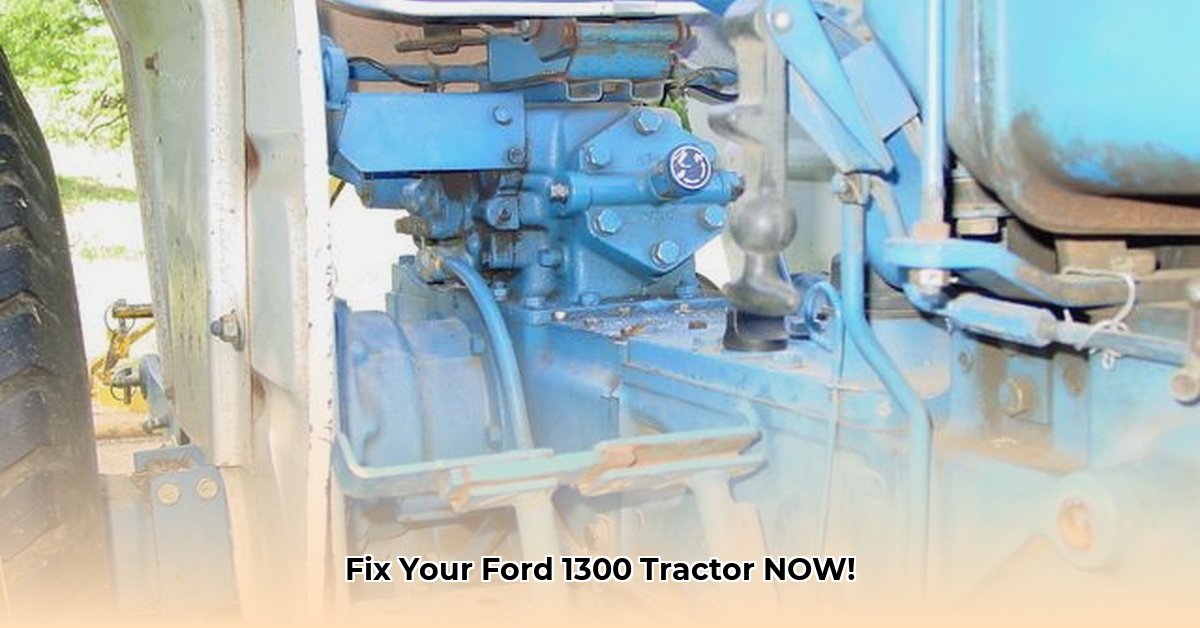
This comprehensive guide provides step-by-step troubleshooting for common Ford 1300 tractor problems, focusing on the Shibaura engine. Avoid using ether starting fluid, as it can cause significant engine damage. For more information on Ford tractors, see this useful resource.
Hard Starting
A difficult start usually points to fuel delivery issues. Follow these steps:
Check the Fuel Filter: A clogged filter restricts fuel flow. Inspect and replace if necessary. (This is a simple, inexpensive fix.)
Inspect Fuel Lines: Look for cracks, leaks, or kinks in the fuel lines. Repair or replace damaged sections.
Examine the Fuel Pump: A weak or failing fuel pump may not deliver enough fuel. Listen for a faint whirring sound; a professional mechanic can assess its condition.
Test Glow Plugs (Cold Weather): Non-functioning glow plugs hinder starting in cold conditions. Replace faulty plugs. (This is usually a straightforward DIY repair.)
Investigate the Injection Pump: This component precisely meters fuel delivery. Malfunction requires professional diagnosis and repair. (This is a complex system best left to experienced mechanics.)
Engine Knocking
Knocking indicates internal engine problems, potentially serious. Act quickly:
Check Oil Level: Low oil leads to metal-on-metal contact, causing knocking and damage. Add oil if needed.
Listen Carefully: Identify the knock's location and rhythm. A rhythmic knock might suggest connecting rod issues; a random clatter might indicate piston slap.
Compression Test (Advanced): This measures cylinder compression. Low compression indicates worn piston rings or valve problems. (Requires a compression tester.)
Visual Inspection (Expert Only): A visual inspection requires engine disassembly and is best left to professionals.
Seek Professional Help: Engine knocking often needs professional diagnosis and repair.
Power Loss
Reduced power can stem from several sources:
Re-check Fuel System: Re-examine the fuel filter, lines, and injection pump for any developing problems.
Inspect Air Filter: A clogged air filter restricts airflow, reducing engine performance. Replace a dirty filter. (A quick and inexpensive fix.)
Governor Issues: A malfunctioning governor may limit engine speed and power. Requires professional attention.
Transmission Problems: Transmission issues can restrict power transfer to the wheels. Check fluid levels and gear operation.
Component-Specific Troubleshooting
| Component | Common Problem | Possible Causes | Troubleshooting |
|---|---|---|---|
| Connecting Rods | Bending, breakage | Overloading, ether use, wear and tear | Inspection; often requires engine disassembly |
| Crankshaft | Wear, misalignment | Overloading, ether use, lack of lubrication | Alignment checks; potential replacement (major repair) |
| Fuel Injection Pump | Failure, low pressure | Wear, contamination, poor calibration | Testing, calibration, or replacement |
| Pistons | Damage, wear | Overheating, ether use, lack of lubrication | Inspection; honing or replacement may be needed |
| Transmission | Shifting difficulties, failure | Worn gears, insufficient fluid, worn parts | Check fluid levels; inspect for worn parts |
Preventative Maintenance
Regular maintenance is crucial:
- Regular Oil Changes: Follow manufacturer recommendations.
- Fuel Filter Replacements: Prevents clogging.
- Fluid Level Checks: Monitor all fluid levels regularly.
- Visual Inspections: Check for wear and tear.
- Avoid Ether: Ether use inflicts severe engine damage.
Risk Assessment and Regulatory Considerations
Ether use is high-risk, potentially causing catastrophic engine failure. Dispose of used parts and fluids responsibly, according to local regulations.
Conclusion
Troubleshooting your Ford 1300 requires a systematic approach. Start with simple checks and seek professional assistance when needed. Preventative maintenance and avoiding ether are key to minimizing repairs and extending your tractor's lifespan. Don't forget regular inspections for early detection of problems. A well-maintained tractor equals a productive tractor.